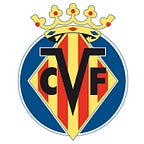Fernando Roig: The man who transformed Villarreal
By Ben Feldman
Amidst the scenes of unbridled joy as Villarreal clinched the Europa League crown after an epic penalty shoot-out victory over Manchester United, the minds of everyone associated with the club were drawn to one man above anyone else.
“I dedicate the title to Fernando Roig, for everything that he has built here in Villarreal,” said Unai Emery.
The greatest moment in Villarreal’s 98-year-history was the crowning moment for a club whose irrepressible rise began just over 24 years ago, on the day Roig became club president.
In May 1997, the picture looked entirely different for the Yellow Submarine. Their tenth-place finish in the Segunda División matched the club’s objective of consolidating their place in the second tier of Spanish football. Their home, El Madrigal, was not in the best condition to welcome the average home crowds of 2,500 supporters and the training facilities hosted the club’s one youth team, which was made up of 15 players.
Roig, a renowned local businessman who had made his fortunes primarily as the owner and president of Pamesa Cerámica, completed his takeover of the club after purchasing it for the cost in pesetas of what would be a quarter of a million euros today, before immediately outlining his vision.
Villarreal would, according to their new owner, not only be a major force in LaLiga, but also in Europe. The stadium would be modernised, a football complex would be built and a cantera would be created to produce outstanding young talent to make the transition into the first team.
A year later, those who had mocked him after his takeover were silenced, as the Yellow Submarine were promoted to LaLiga for the first time in the club’s history, with three new stands fitted at El Madrigal.
Relegation was followed by immediate promotion, with their president orchestrating the club behind the scenes to ensure that this time, they were in the top flight to stay.
Roig instructed his son, Fernando Roig Negueroles, to set up a large scouting network covering Castellón and the rest of Spain, as well as Europe and South America. At the same time, work began on the Ciudad Deportiva, the vast football complex that would serve as the club’s main training ground, with nine pitches and a players’ residence for the new cantera, which was opened in 2003.
At the same time, Roig aimed to make the team at the start of each season stronger than it had been at the start of the previous season, working with his trusted chief executive José Manuel Llaneza to fulfil this objective.
With the likes of Martin Palermo and later Juliano Belletti arriving at El Madrigal, Villarreal went from strength to strength on the pitch, reaching the UEFA Cup for the first time in the 2003/04 season, before this run ended at the semi-final stage with defeat to Valencia.
Roig’s decision to appoint Manuel Pellegrini that summer proved inspired. Not only did the Chilean coach lead the club to Champions League qualification for the first time in the 2005/06 season, in a memorable run that saw Villarreal progress all the way to the semi-final, but during his four-year tenure, his teams played some of the best attacking football that had ever been seen at El Madrigal, finishing third, seventh, fifth and second in LaLiga.
From the highs of Pellegrini’s spell came the low of relegation in 2012. However, thanks to their president’s determination that the team would be promoted immediately and his decision to place even more emphasis on bringing through players from the cantera, the Yellow Submarine returned to LaLiga the following season, after breakthrough seasons for the likes of Manu Trigueros, Gerard Moreno and Moi Gómez.
Villarreal’s return to the top flight came with an unrelenting determination to re-establish themselves amongst the elite in Spanish football. Between 2013 and 2020, they finished in the top six in LaLiga in all seasons except one, before Unai Emery was unveiled as the new head coach last June.
For all of the enormous strides that Villarreal have taken as a club during the years of Roig’s presidency, the president has also had a transformative effect away from the pitch. His work to look after the local community has been as tireless as his work to look after the club and everyone in it.
From creating the community-focused Endavant project in 2004 to renaming the 25,000-capacity El Madrigal to the Estadio de la Cerámica in 2017 to promote the local ceramics industry, as well as the innumerable examples of his own kindness, his impact on the club’s local community has been astonishing, and speaks volumes about his character, as not only one of the most righteous and honest men in football, but in any walk of life.
As Emery led Villarreal to their first Europa League triumph, Roig was unable to attend the match due to UEFA protocols after recently having recovered from COVID-19.
However, his imprint was felt incredibly deeply in Gdańsk, and whilst Pau Torres, the Vila-real-born starlet who graduated from the club’s cantera, recorded his celebrations with the supporters, he had a special word for the man who has transformed the club since he became president a little over 24 years ago.
“You made all of this happen, Presi. We love you.”
And when the trophy was back on Spanish soil, the Yellows’ beloved ‘Presi’ finally got a much-deserved hold of it. The man who changed everything.
